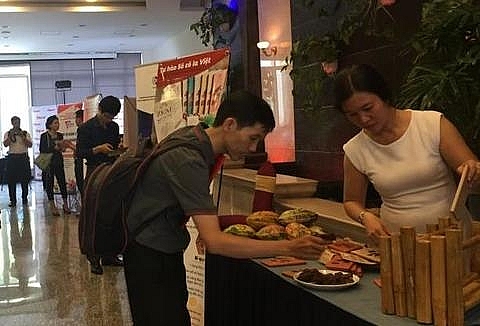Overseas Vietnamese help local startups
 |
| Startups introduce their products at a event held in HCM City. - VNS/Photo.Ngọc Diep |
Phung Cong Dung, chairman of the Overseas Vietnamese Committee in HCM City, told Viet Nam News that many people who have been successful in their career in other countries have invested in businesses here.
Many young overseas Vietnamese have also returned with many experiences and broad knowledge to set up businesses, especially in HCM City.
City authorities, including the Department of Science and Technology, has provided preferential policies on innovation to assist business startups, Dung said.
Many conferences, such as the one held yesterday by the committee, help overseas Vietnamese connect with young people who have ideas for startups. At the conference held yesterday, young people presented their startup ideas to investors.
Peter Hong, who is Vietnamese-Australian, and vice chairman of the board of the Business Association of Overseas Vietnamese (BAOOV), said that many foreigners come to the country to start businesses.
“Overseas Vietnamese have more advantages, such as the native language and a deeper understanding about culture and laws of Viet Nam,” he said. "It is also very important that they comply with laws and understand tariffs."
Danny Vo Thanh Dang, vice chairman of BAOOV, said that he returned to Viet Nam from Singapore in 2008 because of Viet Nam's economic growth.
Dang provides counselling on brand names and startups. He said that startups should not only help Vietnamese customers but others around the world, and should change consumers’ behaviour as the ride-hailing service Grab has done.
Startups should also have a deep understanding about the needs of each market, Dang said, adding that they should also connect with many enterprises to seek opportunities.
“It's very important that they build a brand name, which will help with promotion and advertising,” he added.
According to the Department of Science and Technology, nearly 15 per cent of enterprises in the city are science and technology companies.
There are 75 universities and colleges, more than 270 research institutes and centres with more than 125 labs, and more than 20,000 scientists.
What the stars mean:
★ Poor ★ ★ Promising ★★★ Good ★★★★ Very good ★★★★★ Exceptional
Related Contents
Latest News
More News
- State corporations poised to drive 2026 growth (February 03, 2026 | 13:58)
- Why high-tech talent will define Vietnam’s growth (February 02, 2026 | 10:47)
- FMCG resilience amid varying storms (February 02, 2026 | 10:00)
- Customs reforms strengthen business confidence, support trade growth (February 01, 2026 | 08:20)
- Vietnam and US to launch sixth trade negotiation round (January 30, 2026 | 15:19)
- Digital publishing emerges as key growth driver in Vietnam (January 30, 2026 | 10:59)
- EVN signs key contract for Tri An hydropower expansion (January 30, 2026 | 10:57)
- Vietnam to lead trade growth in ASEAN (January 29, 2026 | 15:08)
- Carlsberg Vietnam delivers Lunar New Year support in central region (January 28, 2026 | 17:19)
- TikTok penalised $35,000 in Vietnam for consumer protection violations (January 28, 2026 | 17:15)

 Tag:
Tag:




















 Mobile Version
Mobile Version